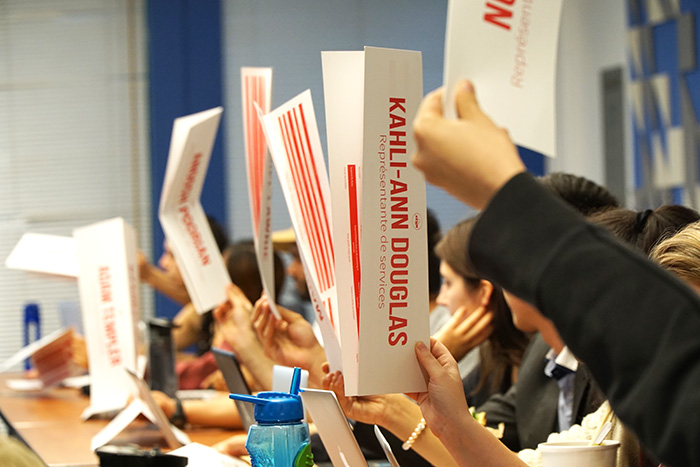At the Sept. 29 Students’ Society of McGill University (SSMU) Legislative Council, an initial report on the Society’s budget was presented by Vice-President (VP) Finance Niall Carolan. Additionally, executives gave reports on the formation and progress of various committees as well as upcoming plans for the year.
2016-2017 SSMU budget overview
Carolan reported on the budget, which will be finalized and presented at the Oct. 13 Council meeting after SSMU has been audited. Carolan addressed issues of sponsorship, the Student Run Cafeteria (SRC), and Gerts.
“Sponsorship is something that we’ve always used at the SSMU, and […] it has […] come into public light recently,” Carolan said. “However, I just want to provide a little context [….] There are two main allocations of sponsorship [….] A small portion of sponsorship is [for] general administration, and that’s used to pay for our sponsorship coordinators [….] The remaining portion of the sponsorship revenue goes directly to the events that it’s used to […] sponsor. And then more general sponsorship […] around the building and […] specific tabling events [….] goes directly into offsetting the costs of running this building.”
Carolan acknowledged one of the challenges with sponsorship lies in figuring out its impact on the student body. According to Carolan, the goal is to add to the student experience, not to detract from it.
“[Balancing that impact is] something we’re focusing on acutely now, after hearing input from students and […] campus media,” Carolan said. “Also, finding ways to make sponsorship more student-centred and ultimately […] ways that sponsorship can add value to students’ lives on campus[….] Some opportunities we have include getting students more involved in the reviewing of sponsors, and again, just trying find ways to add value to students’ lives through sponsorship.”
According to Carolan, SSMU has been exploring avenues to make the SRC more profitable. Although sales more than doubled in 2016 to approximately $221,000, this was accompanied by a rise in expenses, which in turn led to a deficit of $120,000 in the same year.
“A lot of [why that happened] is to do with how the SRC was set up,” Carolan said. “Advertising, for instance, as per [SSMU’s Memorandum of Agreement (MOA), the SRC is] not allowed to advertise anywhere on campus. This heavily restricts our promotional capacity to McGill students [….] Other issues are some of the mandates the SRC has [….] Things like using locally-sourced produce, sustainable produce, [and] paying workers fair wages. All of those things are good mandates, however, [they do] restrict our ability to be profitable.”
In order to regain profits in the SRC, SSMU is tracking sales on an hourly basis. Carolan emphasized that making the SRC profitable is a priority for all of the executives this year.
“I think having a student operation in this building is […] of paramount importance and I’ve always said that having a profitable student-run operation is always our […] top goal,” Carolan said. “However, we have been working through just about every executive portfolio and permanent staff member available […] on ways we can increase sales and more accurately attribute our costs to those sales.”
Other current and planned initiatives for the SRC include targeting off-campus sales, increasing catering, and introducing McGill ID card scanners to draw in first-years.
Executive Reports
VP Internal Daniel Lawrie addressed some of the positive feedback regarding this year’s Frosh. He also identified aspects of Frosh that could be improved for next year.
“We came up with a few key things that we could work on for next year. We found that [the] communication between all our faculties had improved significantly, but we could still work on that further […],” Lawrie said. “We also had a meeting with the administration about the street teams. Again, that was extremely positive.”
Lawrie also explained his upcoming projects, namely Four Floors and the McGill app. Lawrie plans to integrate SSMU services like the listserv into the app, as well as use it for event ticketing this year.
VP University Affairs Erin Sobat commented on the current state of the Draft Policy for Sexual Violence, which will be presented at the Oct. 19 Senate meeting, and voted on at the Nov. 19 meeting.
“We’re doing a wide range of consultation on this,” Sobat said. “We’ve got a whole bunch of focus groups that have been happening last week and this week until about [Oct. 3], which we are going to be compiling a report on to take to Senate.”
President Ben Ger explained a possible new initiative to increase attendance at the General Assembly (GA) by providing academic accommodations during the assemblies.
“The idea of potentially having some sort of academic amnesty, which would mean that [students] could not be graded during days in which the GA is happening,” Ger said. “That would be a McGill policy so that students could come out to attend the GA without fear of […] grades or missing class [….] The other option is having all classes cancelled or moved that day—with the exception of some […] labs.”
Ger explained that Associate Provost (Policies, Procedures, and Equity) Angela Campbell and Provost and Dean of Students Christopher Buddle both seemed receptive to the idea.
“Having more representation at the GA was something that they were behind—more engagement with debates on campus […],” Ger said. “ Moving forward, it will be brought to the Student Life and Learning team, as well as some other areas.”
A previous version of this article incorrectly identified that advertising on campus is against the SRC MOA. In fact, it goes against the MOA of SSMU. A previous version of this article also incorrectly identified that Associate Provost (Policies, Procedures and Equity) Angela Campbell and Vice-President (Academic) Christopher Manfredi both seemed receptive to the idea of academic amnesty during SSMU GA periods. In fact, Associate Provost (Policies, Procedures and Equity) Angela Campbell and the Dean of Students Christopher Buddle have both seemed receptive to the idea.









